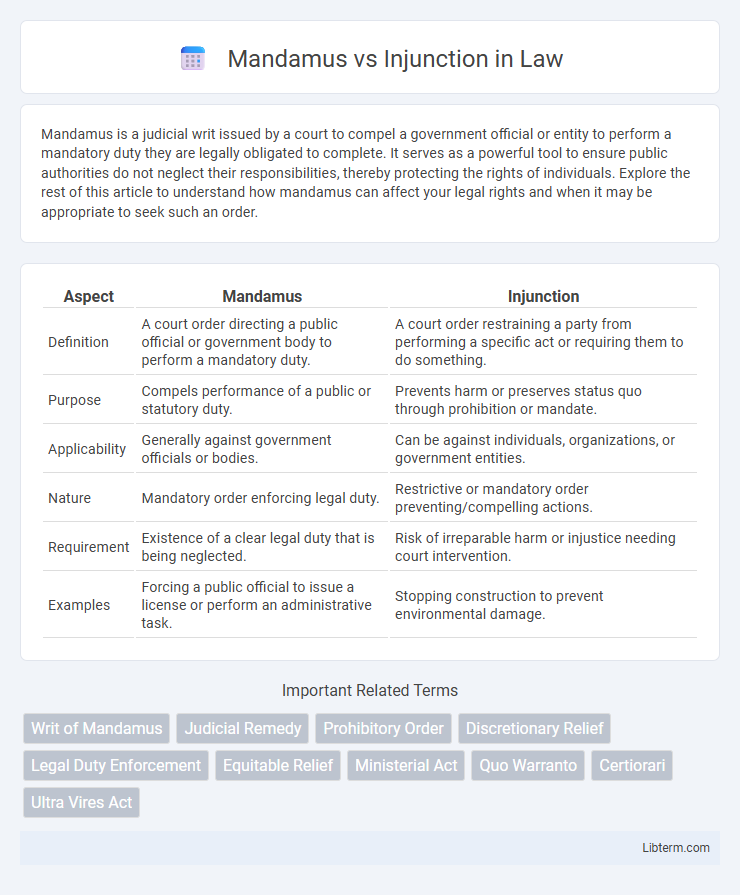Mandamus is a judicial writ issued by a court to compel a government official or entity to perform a mandatory duty they are legally obligated to complete. It serves as a powerful tool to ensure public authorities do not neglect their responsibilities, thereby protecting the rights of individuals. Explore the rest of this article to understand how mandamus can affect your legal rights and when it may be appropriate to seek such an order.
Table of Comparison
| Aspect | Mandamus | Injunction |
|---|---|---|
| Definition | A court order directing a public official or government body to perform a mandatory duty. | A court order restraining a party from performing a specific act or requiring them to do something. |
| Purpose | Compels performance of a public or statutory duty. | Prevents harm or preserves status quo through prohibition or mandate. |
| Applicability | Generally against government officials or bodies. | Can be against individuals, organizations, or government entities. |
| Nature | Mandatory order enforcing legal duty. | Restrictive or mandatory order preventing/compelling actions. |
| Requirement | Existence of a clear legal duty that is being neglected. | Risk of irreparable harm or injustice needing court intervention. |
| Examples | Forcing a public official to issue a license or perform an administrative task. | Stopping construction to prevent environmental damage. |
Introduction to Mandamus and Injunction
Mandamus is a judicial writ that compels a government official or entity to perform a mandatory duty legally owed to the petitioner. Injunction is a court order that restrains a party from specific acts or compels them to act in a certain way to prevent harm. Both remedies serve distinct purposes in administrative and civil law, with mandamus enforcing duty performance and injunction preventing wrongful conduct.
Defining Mandamus: Meaning and Scope
Mandamus is a judicial writ compelling a government official or public authority to perform a mandatory duty legally required of them, ensuring administrative accountability. It is limited to acts that are clear, specific, and non-discretionary, focusing on enforcing statutory obligations rather than correcting errors or preventing harm. This remedy applies when no other adequate legal remedy exists, emphasizing the enforcement of public duties over private rights.
Understanding Injunction: Types and Purpose
Injunctions serve as court orders that compel or prohibit specific actions to prevent harm or preserve the status quo. The main types include prohibitory injunctions, which stop parties from doing certain acts, mandatory injunctions that require positive action, and interlocutory injunctions issued temporarily during litigation. Their purpose is to provide immediate legal relief and protect rights before a final decision is reached.
Legal Foundations of Mandamus
Mandamus is a judicial remedy rooted in common law, compelling a government official or public agency to perform a mandatory duty clearly established by law. Its foundation lies in ensuring administrative accountability where no other adequate legal remedy exists. Unlike injunctions that prevent or restrain actions, mandamus commands affirmative action to enforce legal obligations.
Legal Grounds for Granting an Injunction
Legal grounds for granting an injunction include demonstrating a substantial likelihood of success on the merits, the presence of irreparable harm that cannot be remedied by monetary damages, and a favorable balance of equities that weighs in the plaintiff's favor. Courts also consider whether granting the injunction serves the public interest, especially in cases involving constitutional rights or government actions. Unlike mandamus, which compels a government official to perform a clear legal duty, injunctions primarily aim to prevent ongoing or imminent harm by restraining specific actions.
Key Differences Between Mandamus and Injunction
Mandamus is a court order directing a government official or public authority to perform a mandatory duty, whereas an injunction is a judicial order that either restricts or compels a party from doing specific acts to prevent harm. Mandamus addresses public duties and typically enforces actions required by law, while injunctions can involve both private and public parties and aim to maintain the status quo or prevent irreparable damage. The scope of mandamus is limited to official obligations, whereas injunctions have a broader application in civil disputes for prohibitive or mandatory relief.
When is Mandamus Applicable?
Mandamus is applicable when a public official or body fails to perform a mandatory duty imposed by law, and there is no other adequate legal remedy available. Courts issue mandamus to compel the performance of clear, non-discretionary acts required by statute or legal obligation. It is not appropriate for directing discretionary actions or decisions open to judgment.
Situations Warranting an Injunction
Situations warranting an injunction typically involve preventing ongoing or imminent harm, such as stopping a party from breaching a contract, trespassing on property, or engaging in unfair business practices. Courts issue injunctions to maintain the status quo and avoid irreparable damage when monetary compensation is insufficient. Injunctions are crucial in cases involving environmental protection, intellectual property rights infringement, and safeguarding personal freedoms.
Landmark Cases: Mandamus vs Injunction
The landmark case of Marbury v. Madison (1803) established the foundation for writs of mandamus by demonstrating the courts' authority to compel government officials to fulfill their duties. In contrast, Shelley v. Kraemer (1948) is a pivotal case for injunctions, where the Supreme Court issued an injunction prohibiting racially restrictive covenants, affirming the court's power to prevent unlawful acts. These cases underscore the distinct judicial remedies where mandamus enforces mandatory duties and injunctions prevent or restrain actions.
Conclusion: Choosing the Right Legal Remedy
Selecting between mandamus and injunction hinges on the nature of the legal issue: mandamus compels a public authority to perform a mandatory duty, while injunction restrains a party from specific acts. Mandamus suits are ideal when seeking enforcement of administrative actions, whereas injunctions effectively prevent continued or impending harm in civil disputes. Understanding the scope, purpose, and procedural requirements of each remedy ensures strategic and effective legal outcomes.
Mandamus Infographic

 libterm.com
libterm.com